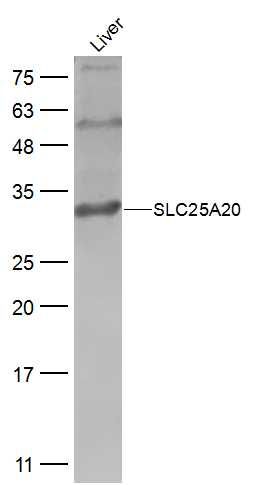SLC25A20 Polyclonal Antibody
Purified Rabbit Polyclonal Antibody (Pab)
- SPECIFICATION
- CITATIONS
- PROTOCOLS
- BACKGROUND

Application
| WB, IHC-P, IHC-F, IF, E |
|---|---|
| Primary Accession | O43772 |
| Reactivity | Rat, Bovine |
| Host | Rabbit |
| Clonality | Polyclonal |
| Calculated MW | 33 KDa |
| Physical State | Liquid |
| Immunogen | KLH conjugated synthetic peptide derived from human SLC25A20 |
| Epitope Specificity | 101-200/301 |
| Isotype | IgG |
| Purity | affinity purified by Protein A |
| Buffer | 0.01M TBS (pH7.4) with 1% BSA, 0.02% Proclin300 and 50% Glycerol. |
| SUBCELLULAR LOCATION | Mitochondrion inner membrane; Multi-pass membrane protein. |
| SIMILARITY | Belongs to the mitochondrial carrier (TC 2.A.29) family. Contains 3 Solcar repeats. |
| DISEASE | Carnitine-acylcarnitine translocase deficiency (CACT deficiency) [MIM:212138]: A rare long-chain fatty acid oxidation disorder. Metabolic consequences include hypoketotic hypoglycemia under fasting conditions, hyperammonemia, elevated creatine kinase and transaminases, dicarboxylic aciduria, very low free carnitine and abnormal acylcarnitine profile with marked elevation of the long-chain acylcarnitines. Clinical features include neurologic abnormalities, cardiomyopathy, arrhythmias, skeletal muscle damage, liver dysfunction and episodes of life-threatening coma, which eventually lead to death. Most patients become symptomatic in the neonatal period with a rapidly progressive deterioration and a high mortality rate. Note=The disease is caused by mutations affecting the gene represented in this entry. |
| Important Note | This product as supplied is intended for research use only, not for use in human, therapeutic or diagnostic applications. |
| Background Descriptions | SLC25A20 is one of several closely related mitochondrial membrane carrier proteins that shuttle substrates between cytosol and the intramitochondrial matrix space. It mediates the transport of acylcarnitines into the mitochondrial matrix for their oxidation by the mitochondrial fatty acid oxidation pathway. Mutations in this gene are associated with carnitine acylcarnitine translocase deficiency, which can cause a variety of pathological conditions such as hypoglycemia, cardiac arrest, hepatomegaly, hepatic dysfunction and muscle weakness, and is usually lethal in new born and infants. |
| Gene ID | 788 |
|---|---|
| Other Names | Mitochondrial carnitine/acylcarnitine carrier protein, Carnitine/acylcarnitine translocase, CAC, Solute carrier family 25 member 20, SLC25A20 (HGNC:1421), CAC, CACT |
| Dilution | WB=1:500-2000,IHC-P=1:100-500,IHC-F=1:100-500,IF=1:100-500,ELISA=1:5000-10000 |
| Storage | Store at -20 ℃ for one year. Avoid repeated freeze/thaw cycles. When reconstituted in sterile pH 7.4 0.01M PBS or diluent of antibody the antibody is stable for at least two weeks at 2-4 ℃. |
| Name | SLC25A20 (HGNC:1421) |
|---|---|
| Synonyms | CAC, CACT |
| Function | Mediates the electroneutral exchange of acylcarnitines (O- acyl-(R)-carnitine or L-acylcarnitine) of different acyl chain lengths (ranging from O-acetyl-(R)-carnitine to long-chain O-acyl-(R)- carnitines) with free carnitine ((R)-carnitine or L-carnitine) across the mitochondrial inner membrane, via a ping-pong mechanism (Probable) (PubMed:12892634, PubMed:18307102). Key player in the mitochondrial oxidation pathway, it translocates the fatty acids in the form of acylcarnitines into the mitochondrial matrix, where the carnitine palmitoyltransferase 2 (CPT-2) activates them to undergo fatty acid beta-oxidation (Probable). Catalyzes the unidirectional transport (uniport) of carnitine at lower rates than the antiport (exchange) (PubMed:18307102). |
| Cellular Location | Mitochondrion inner membrane; Multi-pass membrane protein |

Thousands of laboratories across the world have published research that depended on the performance of antibodies from Abcepta to advance their research. Check out links to articles that cite our products in major peer-reviewed journals, organized by research category.
info@abcepta.com, and receive a free "I Love Antibodies" mug.
Provided below are standard protocols that you may find useful for product applications.
If you have used an Abcepta product and would like to share how it has performed, please click on the "Submit Review" button and provide the requested information. Our staff will examine and post your review and contact you if needed.
If you have any additional inquiries please email technical services at tech@abcepta.com.













 Foundational characteristics of cancer include proliferation, angiogenesis, migration, evasion of apoptosis, and cellular immortality. Find key markers for these cellular processes and antibodies to detect them.
Foundational characteristics of cancer include proliferation, angiogenesis, migration, evasion of apoptosis, and cellular immortality. Find key markers for these cellular processes and antibodies to detect them. The SUMOplot™ Analysis Program predicts and scores sumoylation sites in your protein. SUMOylation is a post-translational modification involved in various cellular processes, such as nuclear-cytosolic transport, transcriptional regulation, apoptosis, protein stability, response to stress, and progression through the cell cycle.
The SUMOplot™ Analysis Program predicts and scores sumoylation sites in your protein. SUMOylation is a post-translational modification involved in various cellular processes, such as nuclear-cytosolic transport, transcriptional regulation, apoptosis, protein stability, response to stress, and progression through the cell cycle. The Autophagy Receptor Motif Plotter predicts and scores autophagy receptor binding sites in your protein. Identifying proteins connected to this pathway is critical to understanding the role of autophagy in physiological as well as pathological processes such as development, differentiation, neurodegenerative diseases, stress, infection, and cancer.
The Autophagy Receptor Motif Plotter predicts and scores autophagy receptor binding sites in your protein. Identifying proteins connected to this pathway is critical to understanding the role of autophagy in physiological as well as pathological processes such as development, differentiation, neurodegenerative diseases, stress, infection, and cancer.


